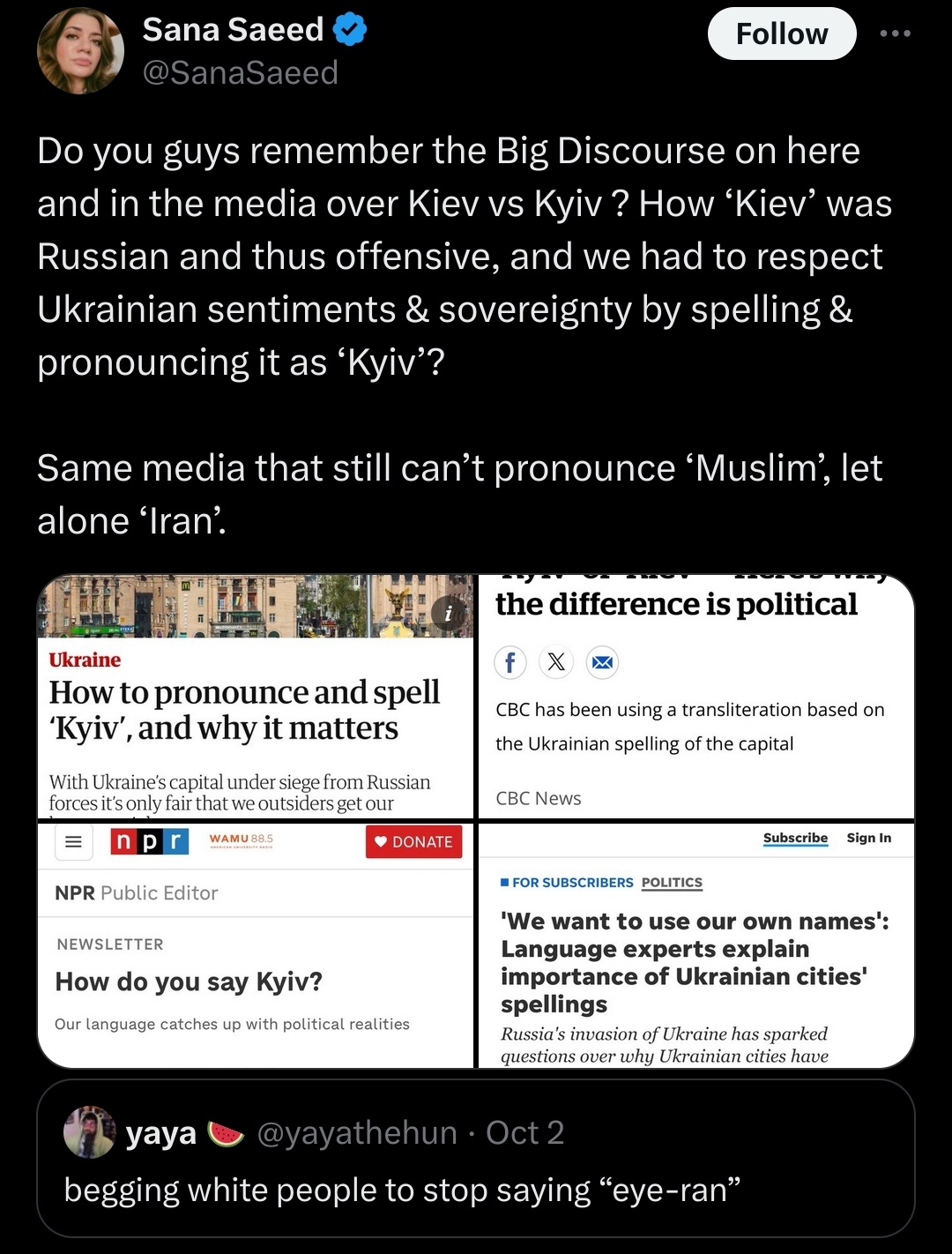136
you are viewing a single comment's thread
view the rest of the comments
view the rest of the comments
this post was submitted on 03 Oct 2024
136 points (92.5% liked)
chapotraphouse
13914 readers
910 users here now
Banned? DM Wmill to appeal.
No anti-nautilism posts. See: Eco-fascism Primer
Slop posts go in c/slop. Don't post low-hanging fruit here.
founded 4 years ago
MODERATORS

It's like the whole "Ukraine" vs "the Ukraine" in English that the media did the same thing for. Russian and Ukrainian don't have definite articles. There is no such thing as "the" in either language. The thing they argue over between Russian and Ukrainian is what preposition to use when talking about something in the territory of Ukraine saying 'на украине' (~"na ookrayeenye") versus 'в украине' (~"v ookrayeenye") meaning essentially "on Ukraine" vs "in Ukraine."
Presumed to be a legacy of an assumed origin of the name Ukraine coming from
so Украина ("Ookrayeenah") under this assumed origin meaning something akin to 'of the outer-edge (of the Russian empire)' kind of like "borderland." It is common place especially with older generations to use на украине instead of в украине, though it also often both get used interchangeably.
That's its own whole mess of history, but US English doesn't have, at all, the historical quirk of "on Ukraine" so it would've always been normal and proper to just say "in Ukraine;" and by making a thing about "Ukraine" vs "the Ukraine" they invented a new problem to then argue about that has no corollary in Russian or Ukrainian to start with.
Probably "the Ukraine" started in English because some anglo dipshit heard the preposition "na" as similar enough to "the" (and la/le for other romance languages if they even knew that) to just assume it was a definite article, and now they won't shut up about it. It's like the origin I heard from a Korean friend that yanks originally made the g*** slur for Koreans because anglos are so unworldly and pig-ignorant they heard "miguk" from Koreans, which literally means "USA/American," and thought it was the Koreans calling themselves the slur, because they assumed "mi" part is like English "me" because, and I can not stress this enough, they are dumb as hell.
also its funny cuz nobody gets mad at the germans for saying "die Ukraine". In fact theres a bunch of country names in german that get used with a definite article, like die Slowakei, die Turkei, die Schweiz.
Isn't that just how the language works though? Like, it sounds unnatural to say certain nouns without adding "the" to the front. Spanish does that too, it's why Das Kapital is called El Capital in Spanish but just Capital in English.
Well the "naturalness" argument feels a bit iffy to me, but in the context of a specific language community, over time, things stick I guess. Like why do germans (I rly should say germanophones since austrians and the swiss do exist) say "der Iran", or "der Jemen"? Who came up with that? Now it probably feels natural to them, but it was never preordained.
Im sure someone more linguistically minded can give the real explanation but in regards to your Capital example, its a peculiar feature of English in relation to the other western european languages where certain abstract nouns are not used with their articles. Like for example in English you can say "Love wins", but in German you cant say "Liebe gewinnt", you say "Die Liebe gewinnt".
Yeah, by "natural" I didn't mean innate or absolute. All languages are made up and for some reason these languages made up the rule that you have to put The before certain words. People can get pretty worked up about language quirks like that. Iirc there was a thread on hexbear about exactly this some time ago (translating das Kapital into Capital in English)